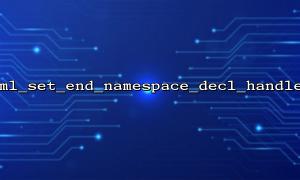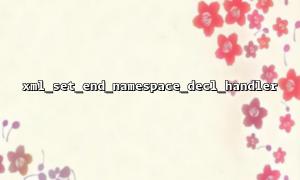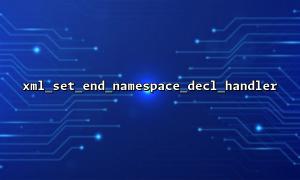The xml_set_end_namespace_decl_handler function is used to register a callback function in the XML parser to call this function when the parser encounters the end of the namespace declaration. The end of a namespace declaration marks the end of the beginning of the XML element, so this is important when dealing with XML.
bool xml_set_end_namespace_decl_handler ( resource $parser , callable $handler )
$parser : This is the XML parser resource to set the callback handler.
$handler : When the namespace declaration is encountered, the callback function will be called.
The xml_set_default_handler function is used to register a callback function that is called when the XML parser encounters an unrecognized event. Usually, this function is used to capture some unpredictable situations.
bool xml_set_default_handler ( resource $parser , callable $handler )
$parser : This is the XML parser resource to set the callback handler.
$handler : When an unrecognized event is encountered, the callback function will be called.
One of the most common problems when using these two functions is that the callback function is not triggered correctly. This is usually because the callback function is defined not in line with the requirements, or the parser is not started correctly.
Solution:
Make sure that the callback function is defined correctly and that the return value is as expected. If the callback functions have parameters, they must match the parameters passed by the XML parser.
function handleNamespaceDeclEnd($prefix, $uri) {
// Processing namespace declaration ends
}
function handleDefault($parser, $data) {
// Handle default events
}
$parser = xml_parser_create();
xml_set_end_namespace_decl_handler($parser, 'handleNamespaceDeclEnd');
xml_set_default_handler($parser, 'handleDefault');
Also, make sure you have successfully created and started the XML parser. The callback function will not be called without starting the parsing process.
If the callback function cannot be handled correctly when encountering namespace or data during parsing, it may be due to format problems in the XML data itself, or the callback function logic is incorrect.
Solution:
Make sure the incoming XML data is legal and in the correct format. If the XML data contains unclosed tags or incorrect namespace declarations, the parser may not trigger the event correctly.
$xmlData = '<root xmlns:foo="http://example.com/foo"><foo:bar>Test</foo:bar></root>';
xml_parse($parser, $xmlData);
In addition, ensure that the definition of all namespaces and processing of data can be correctly handled in the callback function. For example, if your XML contains multiple namespaces, the callback function needs to be able to distinguish and correctly handle these namespaces.
If you find that the callback function is called multiple times in the same parser, it may be because the parser repeatedly triggers the callback during each parsing process.
Solution:
Make sure that after each parsing is finished, you clean and re-initialize the parser. You can use the xml_parser_free function to free up parser resources to ensure that callbacks are not called repeatedly.
xml_parse($parser, $xmlData);
xml_parser_free($parser);
When debugging problems encountered during XML parsing, in addition to checking the logic of the callback function itself, you can also use libxml_get_errors or libxml_use_internal_errors to capture and print error messages. This can help you see more clearly the specific problems that arise during the parsing process.
libxml_use_internal_errors(true);
$parser = xml_parser_create();
xml_parse($parser, $xmlData);
$errors = libxml_get_errors();
foreach ($errors as $error) {
echo "Error: {$error->message}\n";
}
xml_parser_free($parser);
In this way, you can accurately locate the problem and solve it targetedly.
In PHP, xml_set_end_namespace_decl_handler and xml_set_default_handler are very powerful tools for handling namespaces and default events during XML parsing. Although these functions are often used for complex XML processing, developers may encounter some common problems during actual use, such as incorrect callback functions, data processing errors, repeated triggers, etc. These problems can be effectively solved by correctly setting the callback function, checking the XML data format, and using debugging tools to ensure smooth XML parsing.















